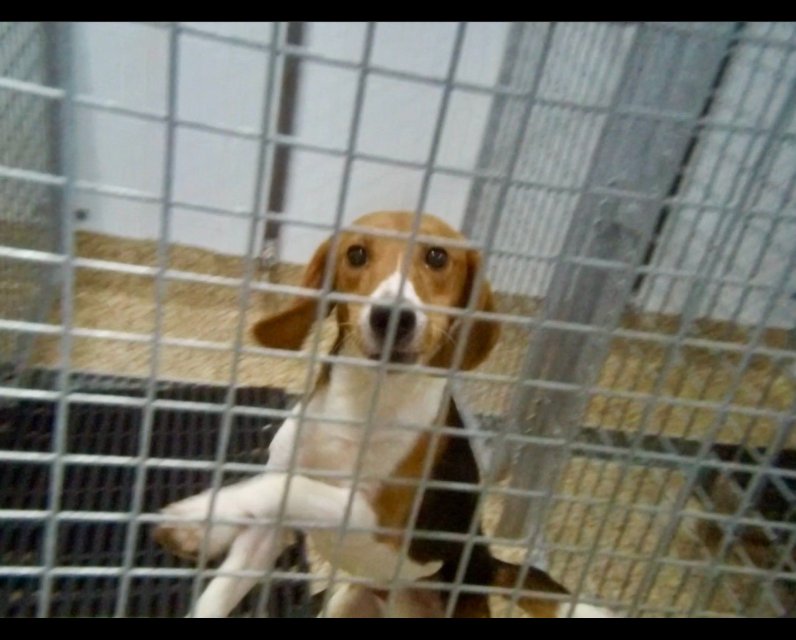Stay informed
Surgeries without anesthesia, severed vocal chords: The dog farm supplying an Ontario lab

For more than a decade a massive Ontario research lab has been importing dogs for scientific experimentation from a U.S. breeder with a history of serious animal cruelty allegations.
Scarborough, Ont.-based Nucro-Technics, which bills itself as Canada’s largest contract research facility, has repeatedly purchased test study dogs from Ridglan Farms, a large-scale breeder based in Wisconsin that recently agreed to surrender its licence to operate as a dog breeder amid a criminal investigation alleging brutal mistreatment of beagles.
Nucro-Technics is now under review by the Canadian Council on Animal Care (CCAC), the national oversight body that sets standards for the care of animals used in scientific research.
The review was triggered by a recent Investigative Journalism Bureau probe that revealed Nucro-Technics conducts scientific experiments on dogs, which in some cases conclude with dogs being “humanely sacrificed.”
The new allegations involve the use of dogs from a supplier that is accused of practices that include mutilating the eye glands and vocal cords of beagles without anesthesia.
Since 2013, Nucro-Technics has been purchasing dogs from Ridglan Farms despite ongoing allegations of animal cruelty. Published studies and months worth of hidden camera video obtained by the Investigative Journalism Bureau that a whistleblower says was secretly recorded in 2023 show the flow of dogs from Ridglan Farms to Nucro-Technics.
The footage appears to show dogs arriving at the 60,000-square-foot Scarborough, Ont. facility in a truck marked “Ridglan Farms” — almost five years after public allegations of abusive treatment against dogs at Ridglan first emerged.
Guidelines from the CCAC state “animals should be obtained from reputable suppliers.” Nucro-Technics is a certified member of CCAC. The CCAC holds no legislative power to fine or impose legal penalties against those that breach its standards. It can only remove certification which can impact the orgnization’s ability to access federal funding.
Nucro-Technics did not respond to repeated requests for comment on what due diligence it conducted on the dogs it purchased from Ridglan.
Ridglan did not respond to IJB interview requests or questions in writing. But it has disputed allegations of animal cruelty and claims the allegations were made on false testimony.
Pierre Verreault, executive director of the CCAC, said the onus is on CCAC-member labs to ensure their animals are sourced from reputable suppliers.
While he wouldn’t comment on whether Nucro-Technics breached its guidelines by purchasing dogs from Ridglan, he said the evidence gathered by the IJB will form part of a current review of the company.
“CCAC-certified institutions must ensure that their suppliers follow animal care practices equivalent to standards required by CCAC guidelines,” said Verreault. “With the new information, the CCAC does not believe that Ridglan is a reputable supplier and does not believe institutions in Canada should be procuring animals for science from this supplier.”
Angela Fernandez, director of the Animal Law program at the University of Toronto, said purchasing animals from a supplier (allegedly) engaged in such practices “is something that should not be permitted…If you just Google the company (Ridglan) you’re going to see they have all these problems.”
Bred for scienceRidglan’s rural Wisconsin facility houses approximately 3,200 beagles at a given time, according to court records. The dogs are purpose bred for biomedical research and shipped to client laboratories, including Nucro-Technics.
The initial allegations against the company’s treatment of animals in 2018 came from an animal rights group called Direct Action Everywhere, which released a report alleging Ridglan dogs are housed in “filth,” alone, in cages made of plastic coated wire in a warehouse filled with “noxious air” and no access to the outdoors.The report gained media attention across the U.S.
In March 2024, animal rights group Dane4Dogs and others asked a judge to appoint a special prosecutor to investigate Ridglan Farms for animal cruelty.
In October 2024, the court heard testimony from several former Ridglan employees, including one who described holding down the dogs while their colleagues performed eye surgery without administering any kind of anesthesia or pain medication.
Blood poured onto the floor while the dogs “would be thrashing around in pain, often yelping, crying out,” before being put back in the cage, said one former employee.
Another former employee who worked at Ridglan between 2006 and 2010, testified the dog’s eyes “would bleed profusely for several minutes.” Back in the cage, the dogs would lick the blood off of each other, he said. “It was a very graphic scene.”
The same employee testified Ridglan severed the vocal cords of 30 to 40 dogs on a monthly basis to lower the volume of their barking. The dogs would be immobilized, but not given anesthesia or pain medication for the procedure, according to the employee.
Such procedures are forbidden in Canada under CCAC guidelines. They also breach provincial legislation in Ontario, the only province with specific laws governing the treatment of animals in scientific research.
According to the Ontario Animals for Research Act, “every animal used in a registered research facility in any experiment that is likely to result in pain to the animal shall be anaesthetized.”
The use of dogs and cats in scientific research has emerged as a political issue in recent months after the IJB’s investigation prompted Ontario Premier Doug Ford to promise forthcoming provincial legislation that would end the practice.
In January 2025, the Wisconsin judge found probable cause “that Ridglan Farms has committed multiple criminal violations” of animal cruelty and appointed a special prosecutor to investigate.
In October of this year, Ridglan Farms reached a deal with the special prosecutor to surrender its licence to breed dogs in exchange for the state agreeing not to pursue criminal charges for alleged violations of animal protection legislation.
The agreement stipulated that Ridglan Farms made “no admission of fault or criminal or civil liability” in entering into the agreement.
Meanwhile, Ridglan’s lead veterinarian was suspended by the Wisconsin Veterinary Examining Board for allegedly delegating surgeries on the dogs to unlicensed employees.
In a recent statement to U.S. media outlets, Ridglan defended the veterinarian as well as the reputation of Ridglan Farms, “which for nearly 60 years has played an important role in the development of health advancements benefitting both animal and human patients around the globe.”
Wayne Hsiung, a U.S. animal rights activist who co-filed the original Wisconsin court petition in 2024, told the IJB that from 2018 onward there was “overwhelming evidence of abuse” at Ridglan Farms detailed in media articles and federal inspections.
“Any failure by Nucro-Technics to act in light of this evidence of criminal abuse is unconscionable,” said Hsiung, who filed the complaint along with animal rights organization Dane4Dogs.
Dane4Dogs now faces a lawsuit from Ridglan Farms alleging “tortious interference with contractual relationships and willful and malicious injury to business.”
Among the allegations, Ridglan said that one of the two former employees who testified to holding down dogs while his colleagues performed surgeries without anaesthesia had provided false testimony.
Ridglan also said that investigators with the U.S. Department of Agriculture conducted an unannounced inspection of Ridglan Farms’ facility on Jan. 22, which “squarely rejected Dane4Dogs’ allegations and found that Ridglan Farms’ operations were in compliance with applicable provisions of the federal Animal Welfare Act.”
The beagles come northNucro-Technics has used dogs from Ridglan Farms in several pharmacology and safety studies between 2013 and 2021, according to published studies. The dogs undergo sometimes invasive experimentation, including heart research and drug safety studies for a list of pharmaceutical companies.
The company’s own Standard Operating Procedure for Purchasing and Receiving Animals lists Ridglan as one of its suppliers as of April 2019.
Reporters reviewed hours of video taken by a whistleblower hired by U.S. animal rights group Last Chance For Animals, who say they worked inside the Scarborough facility two years ago.
The video depicts dogs appearing to arrive at the facility in a truck marked “Ridglan Farms” in cages stacked on top of each other. The dogs “usually” arrive from Ridglan Farms, according to a person appearing to be a Nucro-Technics technician captured in the hidden camera video.
Upon arrival, the dogs are briefly inspected by people who look to be Nucro-Technics staff without being removed from their cages. Dogs with “obvious” injuries are rejected, according to the purported technician featured in the video.
Charu Chandrasekera, founder and director of the Canadian Institute for Animal-Free Science, who reviewed the video footage at the IJB’s request, said using animals with compromised welfare introduces “biological noise that directly undermines the validity and reproducibility of the data.”
“If the supplier can’t guarantee welfare, the lab can’t guarantee science,” she said.
The CCAC’s Verreault echoed concerns that mistreating animals used for research “does have an impact” on the validity of scientific findings.
“Better animal welfare means better science.”
The hidden footage allegedly taken inside Nucro-Technics captured dogs jumping onto the fences of their quarantine enclosures, lashing their tails at the researchers and what appears to be feces smeared on the floors of the cages.
In one scene, two apparent staff wearing blue scrubs are holding down a beagle being injected with an unknown liquid. A second beagle is present watching the procedure. After a few seconds, the first beagle slumps down onto the table, apparently euthanized – a clear breach of CCAC guidelines, said Verreault, who reviewed the footage.
“You don’t do (invasive) procedures in front of animals of the same species,” he said. “That’s to protect the welfare of the animals… It can create distress to the other animals, psychological distress in this case.”
Video materials shared with the CCAC will become part of its investigation of Nucro-Technics, which will also involve interviews with staff and an inspection of the facility’s operating procedures, said Verreault.
Ridglan has until July 1, 2026, to sell off an estimated 3,000 dogs remaining at the facility.
The U of T’s Fernandez says bringing these dogs to Ontario “should not be on the table.”
Nucro-Technics will keep its CCAC certificate of “Good Animal Practice” during the CCAC investigation.
While the CCAC “encourages (institutions) to be as transparent as possible” with the report’s findings, Nucro-Technics can choose not to share results of the review with the public. There is no rule requiring that CCAC findings be made public.
Neither Ridglan nor Nucro-Technics have publicly commented on whether shipments of dogs to Canada have now stopped.
The Investigative Journalism Bureau (IJB) at the University of Toronto’s Dalla Lana School of Public Health is a collaborative investigative newsroom supported by Postmedia that partners with academics, researchers and journalists while training the next generation of investigative reporters.
Our website is the place for the latest breaking news, exclusive scoops, longreads and provocative commentary. Please bookmark nationalpost.com and sign up for our daily newsletter, Posted, here.



Comments
Be the first to comment